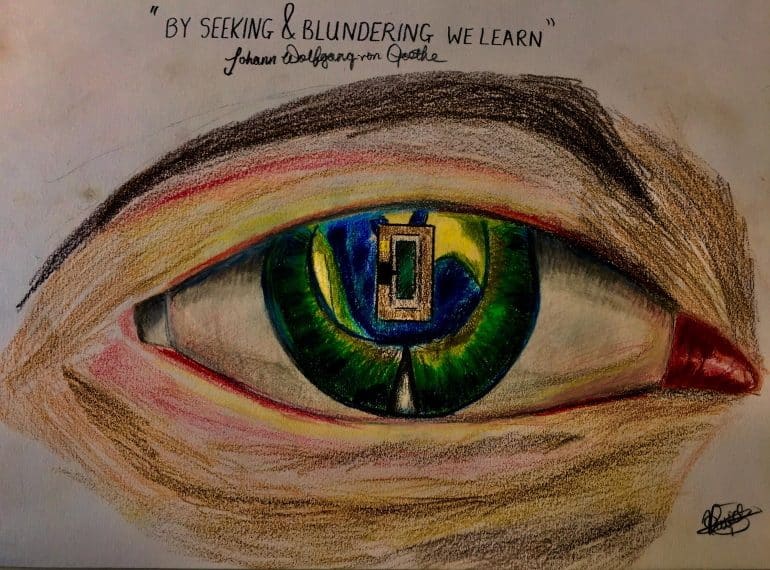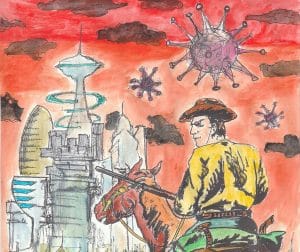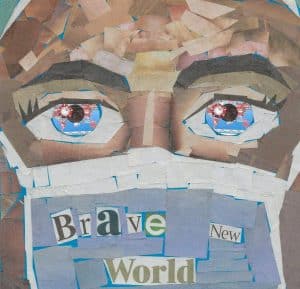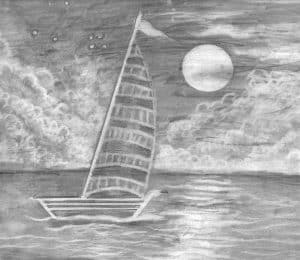
A wealth of creative talent is showcased in this month’s special competition edition of The Arabella – a magazine produced by QE boys featuring the work of the pupils.
 Under the theme, Brave New World, the Art and English departments launched Art and poetry competitions which attracted a high level and standard of entry, many of which are celebrated in the special release.
Under the theme, Brave New World, the Art and English departments launched Art and poetry competitions which attracted a high level and standard of entry, many of which are celebrated in the special release.
Head of English Robert Hyland said: “As a School community, we are getting used to a ‘new normal’, containing paradoxes of collaborative independence and isolated community, and where we are increasingly working in a ‘brave new world’.
“Boys from all year groups were invited to submit original and creative poems and art works exploring this theme – entries could be witty and humorous, contemplative and reflective, or anything in between, as long as they engaged with the theme.
“We were overwhelmed with the response – and thrilled to see such creativity and artistic flair from our boys. We are proud to see that this extraordinary new chapter is bringing out the best in our boys.”
For the Art competition, Head of Department Stephen Buckeridge first showed the boys some book illustrations as examples.
 He ranked their entries on whether the image produced captured the spirit of the Brave New World title and on how it might work as a book jacket design. There were more than 60 entries, covering all the year groups.
He ranked their entries on whether the image produced captured the spirit of the Brave New World title and on how it might work as a book jacket design. There were more than 60 entries, covering all the year groups.
“I have chosen eight that I felt illustrated the theme best – reflecting a kind of dystopian vision,” said Mr Buckeridge.
The overall winners of the Art competition were Haipei Jiang, of Year 10, whose work is pictured top. Next was Alex Aliev, of Year 12, followed by Kovid Gothi, of Year 8, in third place.
“I felt Haipei’s drawing captured the essence of 1950-60s book jacket design and it reminded me of nostalgic times spent in second-hand bookstores as a teenager,” said Mr Buckeridge.
“Alex’s was a strong, imaginative drawing, suggestive of Amazing Stories magazines from the 1950s.
“And Kovid’s collage captured the spirit of our current times.”
In addition to the three main winners, five boys’ contributions were highly commended:
Anik Singh, Year 7
Manthan Thakkar, Year 8
Anubhav Rathore, Year 10
Abhiraj Singh, Year 10
Pierre Mougin, Year 12
Overall winner Haipei said: “It feels incredible to have won an art competition with so many great entries. There is much anxiety worldwide regarding the recent outbreak of COVID-19. However, if we look through another’s eyes, we can see the essence of hope for the future.”
 Alex, who was placed second, added: “I wanted to combine the past, present and future within one drawing. I chose to use a traditional, well-known, scene of a cowboy [pictured above right] overlooking a typical western setting of a desert, but replace it with a futuristic, almost dystopian, element with tall trees and an unknown distant city of skyscrapers. The large viruses that hang above the cowboy are obvious references to the current situation we live in.”
Alex, who was placed second, added: “I wanted to combine the past, present and future within one drawing. I chose to use a traditional, well-known, scene of a cowboy [pictured above right] overlooking a typical western setting of a desert, but replace it with a futuristic, almost dystopian, element with tall trees and an unknown distant city of skyscrapers. The large viruses that hang above the cowboy are obvious references to the current situation we live in.”
Kovid meanwhile was excited by the opportunity to participate: “Despite the fact that there are a lot of brave key workers risking their lives to keep our community and economy running, I was most inspired by the front-line NHS staff who, with limited PPE supply, kept on fighting against the coronavirus and were undeterred by the possibility of losing their own lives. This is my tribute to their bravery and dedication to put themselves in harm’s way to save the rest of the world; Brave New World indeed.” His collage is pictured above left.
There was also a high level of interest in the poetry competition. Mr Hyland chose a winner from each year group:
Year 7 – Keon Robert
Year 8 – Rajanan Shanmugabalan
Year 9 – Akshaj Pawar
Year 10 – Nivain Goonasekera
Year 11 – Ethan Solanki
Year 12 – Tristan Lolay
Year 13 – Matt Salomone
Keon used the word ‘change’ as the basis for his poem. “I wanted my readers to think about what they can do to make an impact on the world. When I found out I was my year group winner I was shocked. I had been able to see some of the other poems through the School’s forums. I’m very proud of my achievement.”
The sensation of feeling trapped was the starting point for Rajanan’s entry, especially having to stay indoors along with finding the courage to get through. “I hope the people that read the poem take away the fact that they aren’t alone, although they may feel like it. We are feeling alone together! To conclude, my reaction to being a year group winner is – amazing! It means the world to me!”
Mr Hyland was impressed to see such a diverse range of approaches to the theme. “They ranged from the natural to the historical to the contemporary. The competition was particularly noteworthy for its technical skill in form and structure, and for the vividness of the imagery.”
The full range of poems can be seen in The Arabella, but two of the winning poems are reproduced below, with some explanatory notes from the authors:
Into a Butterfly
By Akshaj Pawar
How does it feel, the caterpillar? Half of its legs are gone.
It used to like to walk but now –
Now its wings must fly it on.
How does it feel, the caterpillar? Its teeth and jaws are dead.
It cannot crunch on the stalks and stems,
A change has changed its head.
How does it feel, the caterpillar? It can’t hide anymore.
How can it stay safe from the ants?
The ants would kill it for sure.
What can it do in this brave new world without teeth or stealth or legs?
It will drink, it will flee, it will fly.
It will play, it will laugh, it will cry.
In a brave new world, we cannot not know if it will survive.
But the once-caterpillar, it will try.
We all must try.
“This triumph is a great personal victory,” said Akshaj. “I’m honestly mainly glad people like it. While making it, I struggled with rhythm, although I suppose I managed to sort it out in the end. I wanted to make the change in the poem seem striking, and I realised the most striking change possible is being given an entirely different body. Hence the use of a caterpillar’s metamorphosis as a metaphor for a changing world. I realised that the caterpillar’s ability to so easily transition from one form to another and keep going was quite poetic. If you were to take a lesson from Into a Butterfly, it should probably be: don’t let change daunt you, and keep on moving forward.”
Brave New World
By Ethan Solanki
The champions of yore stood arrayed on the field,
And their arrows flew true but were blocked by the shields
And their foes would roar out and then level their spears
And those heroes together laid siege to their fears.
For the sound of the drums was the beat in their chests,
And after the clash each would count themselves blessed,
And the flames of the fallen continued to blaze
As they were embraced by Death’s cold, endless haze
For each soul lived with passion eternal and strong;
And their names in the annals of history belong,
And the deeds of these men changed the world’s warp and weft
And in a glorious state was this brave new world left.
The champions of now stand there tall but alone
As this new war is waged from the confines of home,
As tactics devolve into words on a screen
And the fears of the people are shown by their miens.
For the safety of all is being ripped apart,
As tension and peace conflict within the heart;
As love and wealth come to invisible blows,
As we see to ourselves all the danger we pose.
For whilst Death himself runs rampant on a wild spree
And the flames of the fallen are numbers to be seen,
A lone soul should simply this dark void embrace:
For only as one can we this brave new world face.
Ethan said: “From the way people were talking about the coronavirus, it was made out to be the second coming of the Black Death. So I thought it was important to consider the past and all of the things that occurred to bring us to where we are today. I drew inspiration largely from Lord Byron’s The Destruction of Sennacherib, which to date remains my favourite poem. I hope that people will take away not only the importance of the past, but also that in this time of crisis we don’t abandon one another, but remain in contact over social media, through text, or through Facetime. When I found out that I had won the competition in my year group, I was both surprised and honoured.”
